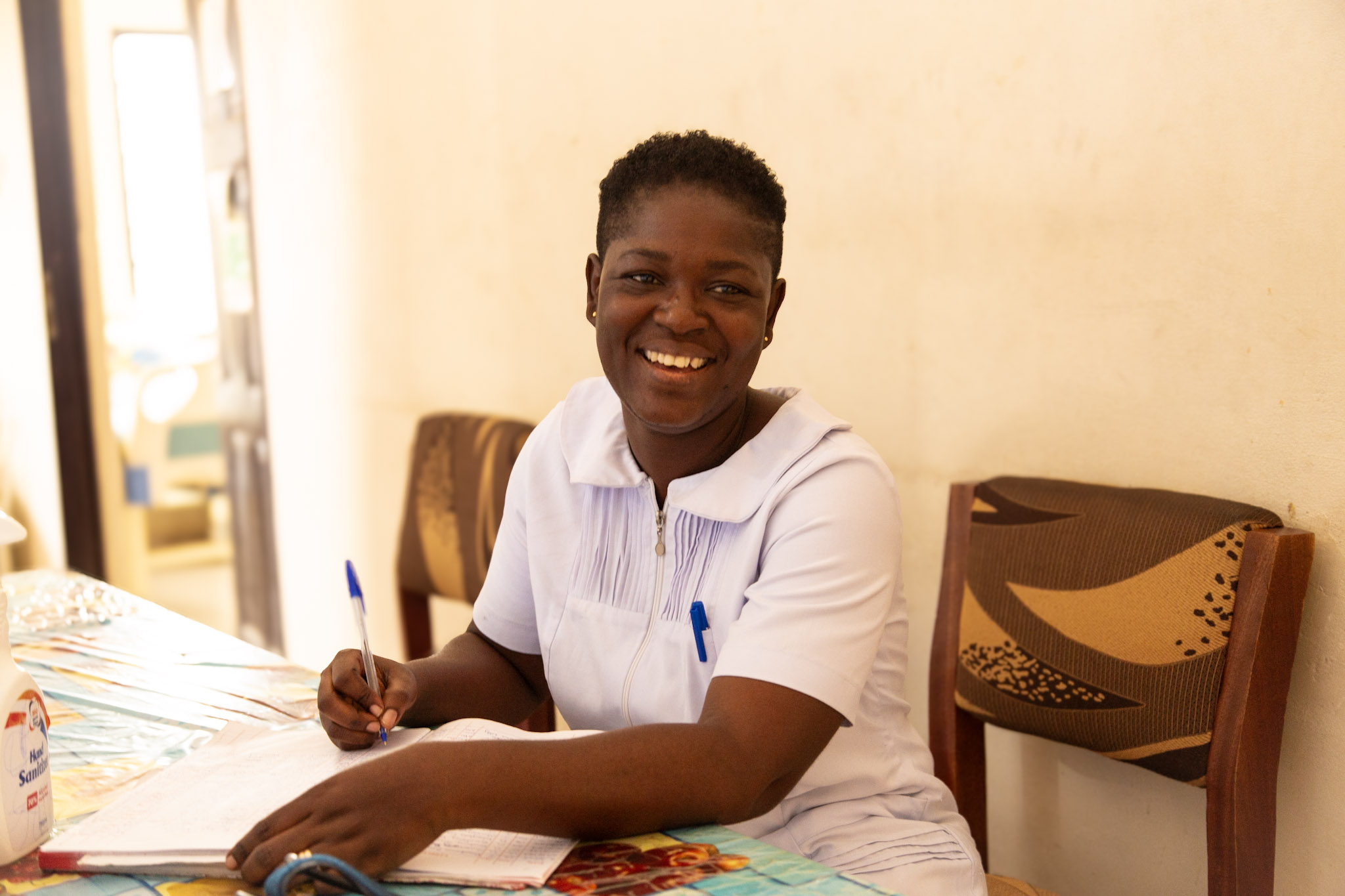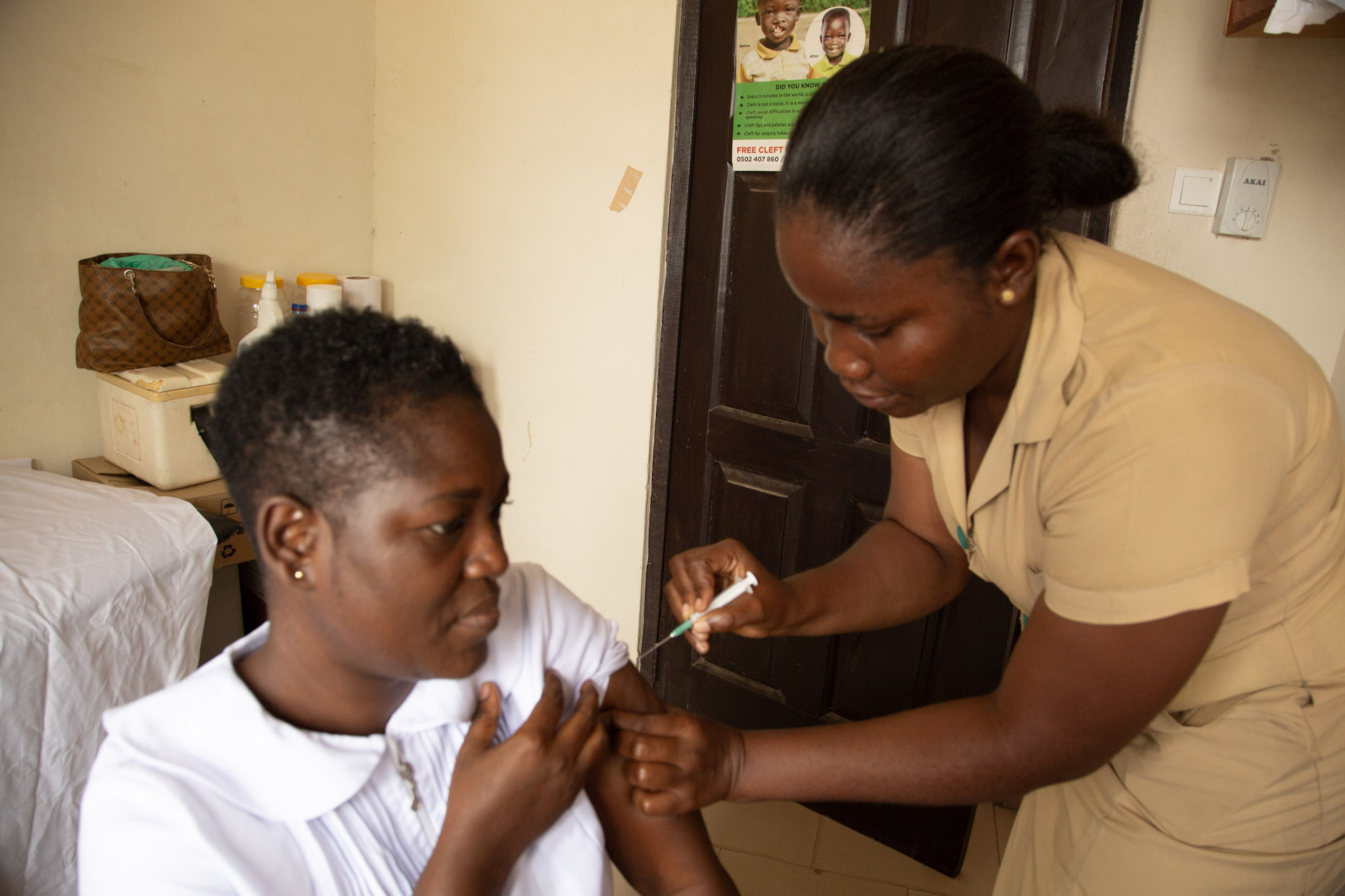
“They told me there was a shortage. Norigynon wasn't available at all, and Depo Provera too. I didn't like the pill because I might forget, and I didn't want to risk it at all.”
Leticia Mensah had big dreams. When she got married, she wanted to be a mother but also wanted to continue her education and transition from a community health worker to a graduate nurse. Although she lives happily with her husband and three beautiful girls in Koforidua, Ghana, Leticia’s radiant smile disguises her past trauma. Unless she tells you her story, you would never know.
One month after her wedding, Leticia got pregnant. But the joy she felt was quickly overshadowed by persistent and severe vomiting, weight loss, and dehydration, a condition known as hyperemesis. She was placed on intravenous fluids and liquid food for most of her pregnancy and was unable to work or go back to school.
About a year after having her first child, Leticia got pregnant again. She hoped it would be easier, but it wasn’t. She had the same problems. After birthing a healthy baby girl, Leticia’s doctor warned her about the risks of having a third child. “I decided I won't give birth again. It is very risky having hyperemesis and giving birth in succession like that, so I decided then that I'll use family planning,” she said.

Leticia Mensah receives an injectable contraceptive in her arm from a nurse. Photo credit GHSC-PSM.
Leticia selected Norigynon, a monthly injectable contraceptive, as her preferred method. But, after a short while, it became unavailable at her clinic. She visited four health facilities, called nurses at several clinics, and was told there was a nationwide shortage. Faced with no other choice, she opted for Depo Provera (or Depo), also a contraceptive injection. After three years, Depo also became unavailable. “For about six to eight months, I wasn't on any [family planning] commodity. Then, after a while, Norigynon became available, then there was a shortage again. Then Depo became available, then there was a shortage again!” Leticia sighed.
Leticia struggled through the unpredictable supply of Depo and Norigynon and eventually gave up. Then, the unexpected happened.
“I just stopped [using contraceptives]. Next thing I knew, I was pregnant. After a space of eight years!” Leticia exclaimed. “I was so disappointed,” she continued. “I wept because I knew I would go through the hyperemesis again. I was very scared. You should have seen me crying, weeping, lying on the floor.”
Leticia was planning to pursue a nursing degree when she discovered she was pregnant with her third child. She had to pause her education, but that delay was minor compared to the serious health issues she faced during the pregnancy. “I was bedridden most of the time. My whole appearance changed. I looked like somebody who had been sick for a very long time,” she recounts.
Many women in Ghana can relate to Leticia’s experience. Shortages of family planning supplies often make it hard for women to choose when and how many children to have. This affects families’ financial planning and the health of both mother and child. This is where the health supply chain comes in. When anyone visits a health facility in need of contraceptives, they have a right to access their preferred choice. Meeting that need requires accurate data and a platform that allows everyone to access the right information at the right time. Insufficient or incorrect data sends wrong messages through the supply chain and can lead to stockouts, overstocks, expired products, and, ultimately, women whose contraceptive needs are not met.
For this system to function efficiently, procurers must anticipate demand, determine the quantity of each commodity to purchase and for whom, and be able to communicate this precise information to manufacturers. At the same time, shippers need details on the destination of commodities, while the central medical stores in countries need to know which quantities of commodities to order and when shipments will arrive.
This is why the USAID Global Health Supply Chain Program-Procurement and Supply Management (GHSC-PSM) project supported the Ghana Health Service in becoming a member of the Global Family Planning Visibility and Analytics Network (GFPVAN or VAN) platform. Hosted by the Reproductive Health Supplies Coalition (RHSC), the VAN links procurers, manufacturers, and shippers to a country’s supply chain system. The platform captures and harmonizes data from many sources and allows users to collectively estimate and prioritize supply needs, leading to more timely and cost-effective delivery of commodities, and reaching more people with the right product at the right time.
“There are no manual inputs here,” said Dr. Claudette Ahliba Diogo, the National Family Planning Manager/Logistics and Supply Manager at the Ghana Health Service. “It is just a click of a button, and you are able to see what you want in terms of stocks and shipments. We don't have to look at different data sets or different documents to be able to make a decision,” she continued.
With the improved efficiency that VAN brings to the Ghana contraceptive supply chain, stakeholders are optimistic about the prospects of improving the supply and availability of contraceptives for more women. With improved visibility and decision-making at higher levels of the supply chain, supply chain managers can prepare evidence-based forecasts and plan their supplies ahead of time.
Today, Leticia has opted for her preferred method of contraception and is excited about what the future holds. “I am happy I'm now at school,” she says. “I'm able to continue with my education, and I have no cause to think about another pregnancy and the traumas that I went through. Now I'm happy living my life.”
Leticia hopes that no woman would have to go through her ordeal. She concludes her story with a message: “Make [contraceptives] available at all times! The shortages go a long way to affect our lives.”